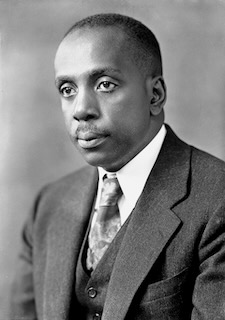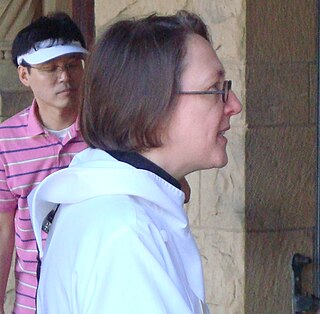Related Research Articles
Fundamentalism is a tendency among certain groups and individuals that is characterized by the application of a strict literal interpretation to scriptures, dogmas, or ideologies, along with a strong belief in the importance of distinguishing one's ingroup and outgroup, which leads to an emphasis on some conception of "purity", and a desire to return to a previous ideal from which advocates believe members have strayed. The term is usually used in the context of religion to indicate an unwavering attachment to a set of irreducible beliefs.

Princeton University is a private Ivy League research university in Princeton, New Jersey. Founded in 1746 in Elizabeth as the College of New Jersey, Princeton is the fourth-oldest institution of higher education in the United States and one of the nine colonial colleges chartered before the American Revolution. The institution moved to Newark in 1747, and then to its current campus, nine years later. It officially became a university in 1896 and was subsequently renamed Princeton University.
Religion is a range of social-cultural systems, including designated behaviors and practices, morals, beliefs, worldviews, texts, sanctified places, prophecies, ethics, or organizations, that generally relate humanity to supernatural, transcendental, and spiritual elements—although there is no scholarly consensus over what precisely constitutes a religion. Different religions may or may not contain various elements ranging from the divine, sacredness, faith, and a supernatural being or beings.
The world's principal religions and spiritual traditions may be classified into a small number of major groups, though this is not a uniform practice. This theory began in the 18th century with the goal of recognizing the relative levels of civility in different societies, but this practice has since fallen into disrepute in many contemporary cultures.
Religion in the United States is widespread, diverse, and vibrant, with the country being far more religious than other wealthy Western nations. An overwhelming majority of Americans believe in a higher power, engage in spiritual practices, and consider themselves religious or spiritual. Christianity is the most widely professed religion, with most Americans being Evangelicals, Mainline Protestants, or Catholics.

Harvard Divinity School (HDS) is one of the constituent schools of Harvard University in Cambridge, Massachusetts. The school's mission is to educate its students either in the academic study of religion or for leadership roles in religion, government, and service. It also caters to students from other Harvard schools that are interested in the former field. HDS is among a small group of university-based, non-denominational divinity schools in the United States.

Howard Washington Thurman was an American author, philosopher, theologian, Christian mystic, educator, and civil rights leader. As a prominent religious figure, he played a leading role in many social justice movements and organizations of the twentieth century. Thurman's theology of radical nonviolence influenced and shaped a generation of civil rights activists, and he was a key mentor to leaders within the civil rights movement, including Martin Luther King Jr.

The Chicago Theological Seminary (CTS) is a Christian ecumenical American seminary located in Chicago, Illinois, and is one of several seminaries historically affiliated with the United Church of Christ. It is the oldest institution of higher education in Chicago, originally established in 1855 under the direction of the abolitionist Stephen Peet and the Congregational Church by charter of the Illinois legislature.
Alexander Barnett Goldberg is the Dean of Religious Life and Belief, Coordinating and the Jewish Chaplain to the University of Surrey, England, a rabbi, barrister, and human rights activist.

Criticism of religion involves criticism of the validity, concept, or ideas of religion. Historical records of criticism of religion go back to at least 5th century BCE in ancient Greece, in Athens specifically, with Diagoras "the Atheist" of Melos. In ancient Rome, an early known example is Lucretius' De rerum natura from the 1st century BCE.
Human rights in Finland are freedom of speech, religion, association, and assembly as upheld in law and in practice. Individuals are guaranteed basic rights under the constitution, by legislative acts, and in treaties relating to human rights ratified by the Finnish government. The constitution provides for an independent judiciary.
Donald Sewell Lopez Jr. is the Arthur E. Link Distinguished university professor of Buddhist and Tibetan Studies at the University of Michigan, in the Department of Asian Languages and Cultures.

Jane Alison Shaw is a British historian of religion, Anglican priest and academic. She is principal of Harris Manchester College, Oxford, Professor of the History of Religion, and Pro-Vice-Chancellor at the University of Oxford. Previously she was Professor of Religious Studies and Dean of Religious Life at Stanford University and Dean of Grace Cathedral in San Francisco.
Saba Mahmood (1961–2018) was professor of anthropology at the University of California, Berkeley. At Berkeley, she was also affiliated with the Center for Middle Eastern Studies, Institute for South Asia Studies, and the Program in Critical Theory. Her scholarly work straddled debates in anthropology and political theory, with a focus on Muslim majority societies of the Middle East and South Asia. Mahmood made major theoretical contributions to rethinking the relationship between ethics and politics, religion and secularism, freedom and submission, and reason and embodiment. Influenced by the work of Talal Asad, she wrote on issues of gender, religious politics, secularism, and Muslim and non-Muslim relations in the Middle East.

The Princeton University Chapel is a Collegiate Gothic chapel located on that university's main campus in Princeton, New Jersey, United States. It replaces an older chapel that burned down in 1920. Designed in 1921 by Ralph Adams Cram in his signature style, it was built by the university between 1924 and 1928 at a cost of $2.3 million. The chapel was rededicated in an interfaith ceremony in 2002 following a major two-year restoration.
Lauren Frances Winner is an American historian, scholar of religion, and Episcopal priest. She is Associate Professor of Christian Spirituality at Duke Divinity School. Winner writes and lectures on Christian practice, the history of Christianity in America, and Jewish–Christian relations.
Ziba Mir-Hosseini is an Iranian-born legal anthropologist, specialising in Islamic law, gender and development. She received her PhD in anthropology from Cambridge University and is the author of several books on Islam, gender, and the family.
Barbara Lewis King was the first bishop of the International New Thought Christian Movement of Churches. She was also the founder of Hillside International Chapel and Truth Center.
Vanessa L. Ochs is an American scholar of religion at the University of Virginia, an ordained rabbi and an important figure in the fields of Jewish feminism and Jewish ritual. She is a member of the Jewish Studies Program at the university, where she teaches courses in Judaism, the anthropology of religion, and spiritual writing.
References
- ↑ "News at Princeton". Archived from the original on 24 February 2015. Retrieved 15 February 2013.
- ↑ "Dean of Religious Life and the Chapel". Archived from the original on 2013-02-05. Retrieved 15 February 2013.
- ↑ Women's Rights and Religious Practice. Palgrave, 2007. 28 November 2007. ISBN 978-0230551442.
- ↑ Schonwald, Josh (24 May 2007). "Boden to depart for Princeton post". University of Chicago Chronicle. University of Chicago. Retrieved 17 November 2019.